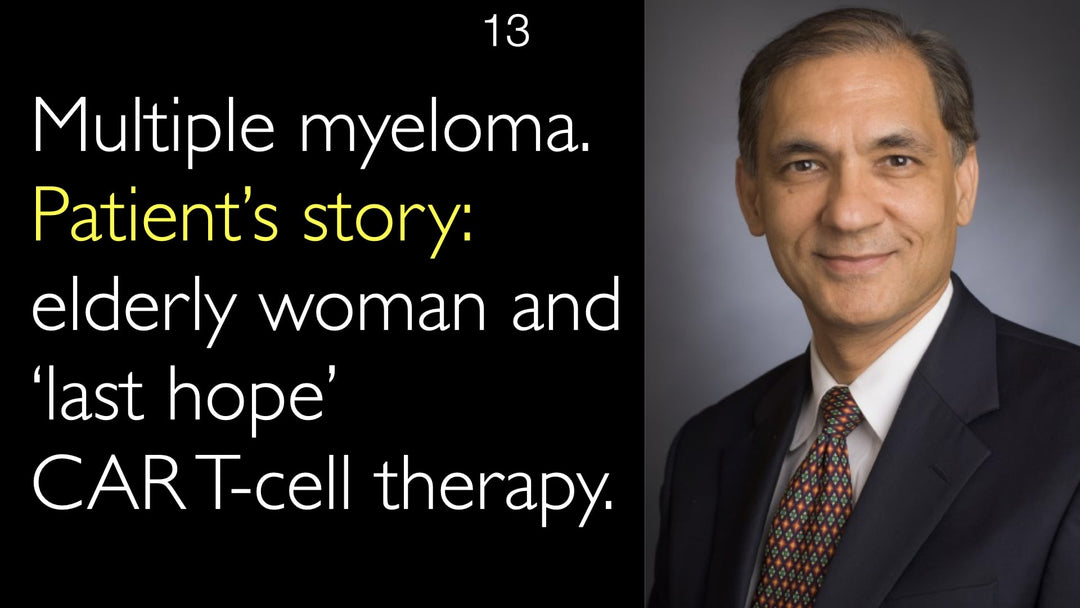Leading expert in thrombosis and bleeding disorders, Dr. Pier Mannucci, MD, explains the limited clinical utility of genetic testing for blood clot risk mutations. He details how common mutations like Factor V Leiden and prothrombin gene mutation are found in 6% of the population. These mutations are risk factors, not direct causes of thrombosis. Dr. Mannucci, MD, clarifies that test results do not change treatment plans for patients who have had a clot. He strongly advises against population screening or testing asymptomatic individuals. This information provides little actionable benefit and can cause unnecessary anxiety.
Genetic Testing for Blood Clot Risk: When Is It Actually Useful?
Jump To Section
- Common Thrombophilia Mutations Explained
- Screening Recommendations and Guidelines
- Clinical Utility of Test Results
- Risks of Genetic Testing in Asymptomatic People
- Practical Advice for High-Risk Situations
- Full Transcript
Common Thrombophilia Mutations Explained
Dr. Pier Mannucci, MD, describes the most frequent genetic mutations linked to an increased risk of venous thrombosis. These are gain-of-function mutations in coagulation factors. The Factor V Leiden mutation results in a hyperactive Factor VIII, leading to excessive clot formation. A prothrombin gene mutation causes an overproduction of thrombin, the final enzyme in the coagulation cascade.
Dr. Mannucci, MD, emphasizes a critical distinction. These mutations are risk factors, not guarantees of disease. They increase relative risk, but the absolute risk of a thrombotic event remains low for most carriers. He notes these mutations are remarkably common, present in approximately 6% of the general population in Western countries.
Screening Recommendations and Guidelines
Dr. Pier Mannucci, MD, outlines clear scenarios where genetic testing is not recommended. There is no need for population-wide screening of healthy individuals. Testing is also not advised for people facing transient high-risk situations, such as major surgery like hip replacement.
He specifically addresses a common referral. Gynecologists sometimes request testing for young women before prescribing combined estrogen-progesterone contraceptive pills. Dr. Mannucci, MD, states that guidelines do not support this practice. The mutation risk is too rare to justify universal screening. The thrombosis risk from pregnancy itself is comparable to the risk from contraceptives for mutation carriers.
Clinical Utility of Test Results
A primary reason against routine testing is its lack of impact on patient management. Dr. Mannucci, MD, explains that discovering a thrombophilia mutation after a clot does not alter treatment. The duration of anticoagulant therapy remains the same regardless of a patient's genetic status.
The main value of testing is often psychological, answering the "why" for a thrombotic event, especially in young patients. However, Dr. Mannucci, MD, cautions that a negative test does not rule out other causes. Often, no single cause is found. He concludes that these tests are "quite useless" for guiding therapy or predicting future risk.
Risks of Genetic Testing in Asymptomatic People
Dr. Pier Mannucci, MD, highlights significant downsides to testing individuals without symptoms. A positive result can create a "tag of a genetic trait," causing unnecessary anxiety and fear. This is particularly concerning for children, as testing labels them with a condition that is not a disease.
He shares compelling data from a study of centenarians. The prevalence of these mutations was 6%, identical to the general population. This proves carriers can live extremely long, healthy lives. The mutations may have even offered a historical survival advantage by reducing fatal bleeding during childbirth or injury.
Dr. Mannucci, MD, also warns of unexpected familial discoveries. If a patient's parents test negative for a mutation the patient has, it can raise difficult questions about paternity. This illustrates the unintended consequences of pursuing genetic information without a strong medical indication.
Practical Advice for High-Risk Situations
Dr. Pier Mannucci, MD, provides practical guidance for managing thrombosis risk. He uses the example of a long-haul flight traveler with multiple risk factors. His recommendation is firmly against prophylactic medication like low molecular weight heparin or aspirin.
Instead, Dr. Mannucci, MD, advocates for non-pharmacological measures. These include maintaining hydration with water, avoiding alcohol and sugary drinks, and preventing immobility by walking in the cabin regularly. He stresses that a healthy lifestyle and awareness are the best defenses, not preemptive drug therapy. This approach is consistent with international literature and expert consensus, as noted by Dr. Anton Titov, MD, during the discussion.
Full Transcript
Dr. Anton Titov, MD: Blood clots in leg veins and thrombosis in pelvic veins can lead to pulmonary embolism. Blood clots often happen in people with a genetic mutation in several genes, such as protein C, protein S, or antithrombin. Blood group type can also affect predisposition to forming blood clots. How do people usually find out that they have a genetic mutation predisposing them to blood clot formation or thrombosis?
Dr. Pier Mannucci, MD: It is a long story with which I was involved because I was a member of the WHO panel many years ago. The scale of functionally important mutations of coagulation factors gave us the state of hypercoagulability. We explained them to some extent. Some, albeit not all, causes of venous thrombosis—but not arterial thrombosis—were discovered.
Now we know that mutations happen with high frequency, so it's relevant in the general population. We mainly deal with gain-of-function mutations. One blood clotting risk mutation is called Factor Five Leiden. As I mentioned, Factor Five Leiden mutation gives a very active Factor V, which, of course, leads to an excess formation of coagulation. It leads to higher coagulability and is a risk factor for thrombosis.
I want to emphasize that the Factor Five Leiden mutation risk factor doesn't mean you will inevitably get the disease thrombosis. It means that you are at more risk than a person without a mutation to develop thrombosis. But we must distinguish the relative risk from the absolute risk, which is still very low, even in these patients.
Then the other established gain-of-function mutation can exist in another coagulation factor, prothrombin. And of course, even there, you have an excess formation of thrombin, the final enzyme in blood coagulation. This has been just as important a discovery. It didn't get the Nobel Prize, but certainly, in our field, prothrombin mutation has been a fundamental discovery.
The problem is what to do with these mutations. Because if you take together these two mutations, they are very frequent in the general population. In the general population of Western countries, together, Factor Five Leiden and prothrombin mutations reach 6%. So the probability of being positive for Factor 5 Leiden or prothrombin mutation is potentially relatively high. But again, you must consider that these are risk factors for thrombosis. It is not a certain indication that they will get thrombosis.
Dr. Anton Titov, MD: What are the current recommendations about Factor 5 Leiden and prothrombin mutations? When should patients be tested for these mutations?
Dr. Pier Mannucci, MD: Certainly, there is no need to test in a generally healthy population. No need for testing even in persons who are undergoing procedures with an additional risk of thrombosis, such as surgery, particularly hip replacement surgery, or women who take oral contraceptives. Because even though, of course, the two risk factors tend to be additive, if not multiplicative, it is still too rare. It is too rare a mutation to justify performing this screening.
For example, which is the most frequent of our referrals, sometimes the gynecologist asks to do these mutation analyses in young women who take combined estrogen-progesterone contraceptives. Usually, we don't recommend testing for thrombosis-related mutations. This is in the guidelines for the reasons I mentioned. So they are of very little use because there are many women who are taking contraceptive pills but who do not develop thrombosis.
And you have to consider that if they don't take the contraceptive pill, they may get pregnant, or they will get pregnant. And pregnancy, of course, carries a risk of thrombosis that is equal to that of these contraceptive medications and thrombosis-predisposing mutations. So that's why, in general, there is no recommended screening for Factor Five Leiden, Protein C, and Protein S mutations, not even in the general population. Not even in situations like the intake of oral contraceptives or before surgery accompanied by a higher risk of thrombosis. So screenings are not recommended.
They are usually done, as I said, with very little evidence, to understand why a person developed thrombosis. Screening for thrombosis-predisposing mutations happens, particularly in young people. Because when a person develops thrombosis, as you know, venous thrombosis and arterial thrombosis are conditions associated with age.
Just to give you an idea, a woman in the reproductive age has 1 in 10,000 odds of developing venous thromboembolism during the time of her reproductive age, let us say till the age of 40 or 45. The situation changes when women get older because, for instance, in menopause, the risk is 1 in 1,000. And it gets much higher when they are over 60 or 70 years of age because the thrombosis risk is 1 in 100.
The calculation is that it is not worthy of a general screening for thrombosis-predisposing mutations in the general population. But you will ask why. It is because it has been shown. For example, I have developed thrombosis. I want to know why I developed thrombosis. So besides all the other risk factors, I do a test for Factor Five Leiden, Protein C, or Protein S mutations.
But what do I do with that information? I learn one of the possible risk factors for my thrombosis. But does it affect my future treatment or my future behavior? And the answer is no because the therapy does not change in the sense that you will not change the treatment of the patient who developed thrombosis. Patients will be treated for the same period, depending on other conditions, as if they had not their thrombosis-predisposing mutations.
Information about thrombosis-predisposing mutations also does not impinge upon the duration of the anticoagulant therapy. In other words, you don't treat them for longer if they have this mutation that increases thrombosis risk. So altogether, you see, there is a general recommendation not to carry out these studies because they don't help prevent thrombosis. They cannot help to tailor the treatment of those who develop thrombosis.
And so, they are only helpful to help understand why patients develop thrombosis. But usually, mutations are considered one of the several risk factors for thrombosis. Sometimes you don't find a cause of thrombosis, even if the patient was negative for this mutation. So that's why thrombosis-predisposing mutations raised a lot of interest. They certainly contributed significantly to our knowledge.
We understood how the gain of function of coagulation factors compared with the loss of function in factors important in coagulation disorders. That's why this topic was dealt with by people like us, who dealt with the fact of coagulation that is bleeding, but also with excessive coagulation, thrombosis. But thrombosis-predisposing mutations are really of very little use. They are very interesting mutations.
Factor Five Leiden, Protein C, or Protein S mutations are probably rather benign. Thrombosis-predisposing mutations are encountered so frequently in the general population. Probably people with such mutations had an advantage at an early age in our humanity. Then the primitive man was going around fighting with animals without getting his wounds bleeding. So they probably helped to stop the bleeding more easily.
That's why these mutations continue to persist because it was an advantageous mutation. At that time, it was probably an advantageous mutation for primitive women of the Neolithic period early at parturition. It was so because, of course, many women died at parturition because of bleeding. And so again, that's why the thrombosis-predisposing mutations were transmitted because only recently, thrombosis has become more frequent.
But again, these mutations haven't changed, in my opinion, the natural history of venous thromboembolism nor its treatment. So that is my main message. Very interesting mutations. We publish a lot of papers on those mutations, as you can see from my bibliography. But what I say is the general consensus.
Then Factor Five Leiden, Protein C, or Protein S mutation test is being carried out very frequently, but mainly because people—and this is also my experience—particularly young people who develop an event like thrombosis that is not typical for their age. Physicians want to know why these young patients developed thrombosis. And so their main question is this question: Why did I get thrombosis? It is asked more often than this question: What is going to happen in the future?
And so that's why sometimes these thrombosis-predisposing mutation tests are done. But in my opinion, they are quite useless.
So there isn't much that a person who is asymptomatic can do about these mutations. A person may have discovered, for example, through genetic screening, which is becoming more common, of course, because people just want to learn whether they might have some mutations that affect their quality of life. So if that person does the genetic screening and discovers that they have a protein, Factor Five Leiden, Protein C, or Protein S mutations, there isn't much they can do with this information.
Well, I don't think it is a good idea to do genetic screening without reason, but only to know. First of all, because I'm not sure you will understand what is there or our destiny is. And think about what I told you. These mutations are a cofactor for developing thrombosis; they are not a reason for not being pregnant. They are not a reason for not taking oral contraceptives.
We did a study on centenarians here in Milan. Centenarians, by definition, are the people who are very healthy. They went through pregnancy; the women had trauma sometimes. These are the situations that are associated with a risk of thrombosis. So if a thrombosis-predisposing mutation had some degree of lethality, you would expect to find in them a lower prevalence of Factor Five Leiden, Protein C, or Protein S mutations.
We found a 6% mutation rate for thrombosis-predisposing mutations in a large population of centenarians. It was as frequent a mutation rate as in the general population. So this means, again, if the people with this mutation could reach an age of 100 years, they are not that detrimental. So I would simply not do the screening for thrombosis-predisposing mutations I mentioned.
First of all, because in general, I don't think it would help me a great deal to understand what will be a life-long course of my life, in terms of illnesses. And particularly for this mutation, I will add something. Let us say that they did the mutation screening test because they had thrombosis. So at least it is not very cogent, but at least it is a soft reason to do thrombosis-predisposing mutation screening.
And then, of course, patients start to ask you, what about my children? Because, you know, the transmission of mutations. So they must have got the mutation either from the mother or the father. And then there is a problem with the children. And we happened to discover this because, of course, you tend to say this: Okay, either your father or your mother did transmit the mutation to you.
I usually use this argument because sometimes, the father and the mother are completely asymptomatic. And so I know that this will reassure the patients, because if the father or the mother could have been older than the proband, there could be a thrombosis event. But a person happened to discover that neither the mother nor the father has a thrombosis-predisposing mutation. Why is it not a fresh mutation?
Probably because the father was not the right one. So that tells you the risks of doing genetic testing. As I said, it applies to the children. Think about that. First of all, okay, I have a five-year-old boy. He doesn't need a blood sample. Why should I do a mutation analysis? Particularly it is worth considering for a boy, and even a girl, you give a tag of a genetic disease.
It is always an unpleasant target, even if you explain that it will not cause any problem, you see. So I think genetic testing is really dangerous because to give somebody a tag of a genetic trait, which is not a disease, but a genetic trait, it is very bad. So I wouldn't do what you said. And I wouldn't do this thrombosis-predisposing mutation test.
I can tell you that even very recently I was approached by a company from Switzerland. They wanted to develop a genetic testing system to offer to women deciding to take oral contraceptives. But it was an algorithm that included many other things. I was not very favorable to that idea. But in any way, they included the gain-of-function mutation testing, but only those mutations were included in testing.
So in a sense, in the end, they gave a risk score for thrombosis. And this again, I wouldn't have done that. I would not recommend that. But at least, risk assessment was not only based on the thrombosis-predisposing mutations. There are around this country and elsewhere, there are several kits that have genetic tests for thrombosis risk.
By the way, genetic testing kits include also testing for thrombosis-related mutations that have not been shown convincingly to be associated with the risk of venous thrombosis and arterial thrombosis. So my private practice has been made larger by people coming with this panel of tests. Obviously, they had heterozygosity and homozygosity for mutations that have never been shown to be associated with thrombosis.
Factor Five Leiden, Protein C, or Protein S mutations at least are solid risk factors. But they are risk factors, not causes of thrombosis.
Dr. Anton Titov, MD: If we could think of a theoretical case. Suppose it's a man in his 40s, who travels because of the job on very long flights around the world, eight hours, 12 hours. And he goes and does the genetic test and discovers he has a Factor Five Leiden mutation. He also discovers that he has a single nucleotide polymorphism that people with Erythrocytemia Vera have. So obviously, it does not mean that he has an Erythrocytemia Vera. But there is a mutation that people who do have Erythrocytemia Vera have that mutation.
Moreover, he looks at his ten years of blood tests. And now he noticed that his red blood cells are always above the upper limit of normal, and his hematocrit is above 50%. So it is always slightly above the normal range, consistently. So now he could ask the question: Should I do low molecular weight heparin when I travel on my 12-hour or 18-hour flight to Australia or the Middle East? Should I just ignore the test results? I now have Factor Five Leiden mutation; I have a high hematocrit, I have higher red blood cells. Is there anything to do?
Does he have a group A or B blood type?
Dr. Anton Titov, MD: Well, okay, this is very interesting. So the blood group type—how does that obviously affect the thrombosis risks? So, what would you say to such a person?
Dr. Pier Mannucci, MD: First of all, I would do no tests. But suppose you do none of these tests. I would know that I am at risk of thrombosis as much as I'm a risk because I'm older, as much as other people are at risk of thrombosis. After all, they have some other condition that facilitates the thrombosis risk. In other words, this is what I would do. I would not take any heparin. I would not take any aspirin.
I would simply try not to drink too much on the plane. I will try to get a lot of non-alcoholic drinks, a lot of water, no sugar, no alcohol drinks. And I would monitor and be ready to go very often to the lavatory, which is unpleasant when you sleep. But this is something they should do. And I will do nothing.
There is nobody recommending, even with a lot of risks, to do any preventive low molecular weight heparin injections before a long-haul flight. So that is the general recommendation. This stems from people like Dr. Frits Rosendaal in the Netherlands, who tackled this issue in a clinical study. This, of course, doesn't deny the situations reported in the media.
There was the case of a young nurse who arrived from Australia. She was on oral contraceptives. She was coming from Australia, from abroad, on a 24-hour flight arriving at Heathrow. She fell with a pulmonary embolism and died. But this is not a reason to do the prevention therapy with what may be dangerous. 'Drug' is a Greek word that means something positive. But it also, as we will come to discuss in polypharmacy, 'drug' means 'venom.'
So I would simply do nothing of what you mentioned. I would realize, if you have all these risk factors for thrombosis, you have to try to have a decent life, do exercise to avoid stasis. You can avoid immobility during the long-haul flight and walk in the plane's cabin. That's what I would do if I had a risk factor for thrombosis and being old.
I would never take any medications for this. I don't think I have any thrombosis-predisposing mutation because, at the time of the early study, I served as a volunteer to develop the method by my laboratory. But even if I weren't, I would advise nothing. Right. So that is my point of view. I think this is consistent with the recommendation of the literature.
They review articles that you cited. But also you would find it difficult to find recommendations different from mine. If you ask other experts, experts, of course, may have different opinions on many aspects. But I don't think on this they would differ. I don't want to be dogmatic and blatant. But I don't think everybody will tell things much different from what I am telling you.


![Blood clots risk and mutations. Do a genetic test or not? 4. [Parts 1 and 2]](http://diagnosticdetectives.com/cdn/shop/products/Dr_Pier-Mannuccio_Mannucci_thrombosis_bleeding_hematology_treatment_Diagnostic_Detectives_Network.005.jpg?v=1660905312&width=1080)
![Blood clots risk and mutations. Do a genetic test or not? 4. [Parts 1 and 2]](http://diagnosticdetectives.com/cdn/shop/products/Dr_Pier-Mannuccio_Mannucci_thrombosis_bleeding_hematology_treatment_Diagnostic_Detectives_Network.005_a2c60dd0-4ea9-4383-ae40-4f9644026086.jpg?v=1660905322&width=1080)
![Blood clots risk and mutations. Do a genetic test or not? 4. [Parts 1 and 2]](http://diagnosticdetectives.com/cdn/shop/products/Dr_Pier-Mannuccio_Mannucci_thrombosis_bleeding_hematology_treatment_Diagnostic_Detectives_Network.005.jpg?v=1660905312&width=720)
![Blood clots risk and mutations. Do a genetic test or not? 4. [Parts 1 and 2]](http://diagnosticdetectives.com/cdn/shop/products/Dr_Pier-Mannuccio_Mannucci_thrombosis_bleeding_hematology_treatment_Diagnostic_Detectives_Network.005_a2c60dd0-4ea9-4383-ae40-4f9644026086.jpg?v=1660905322&width=720)





